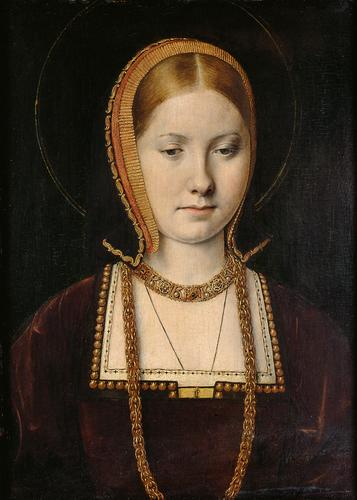Catherine of Aragon, daughter of Ferdinand and Isabella of Spain, whose divorce caused the foundation of the Church of England, visited Exeter in 1501. She was travelling from Spain to London, via Plymouth, en route to marry Prince Arthur, the eldest son of Henry VII, and brother of the future Henry VIII.
Catherine was 15 when she came here in October of that year, and stayed a few nights in the Old Deanery, still standing next to the Cathedral. Legend has it that she was kept awake by the noise of the weathervane at St Mary Major next door, and complained. A servant was duly despatched to the top of the tower to take it off. Nothing was too good for our future Queen!
She subsequently married Arthur, but he died just 5 months later. Eventually, when Henry VIII became king in 1509, she married him.
The painting, by Michael Sittow, is from the Kunsthistorisches Museum in Vienna, and is believed to be a portrait of the young Catherine.
Many thanks to Dorothy Wagland for the story above.
Update
We are indebted to the author Onyeka for bringing a further multi-cultural twist to this tale: Catherine was probably accompanied by her African servant Catalina de Motril. Onyeka writes:
Katherine of Aragon arrived in Plymouth on 2 October 1501. She arrived with a multicultural and multiracial entourage. This reflected that she came from a geographical region (the Iberian peninsula) which had independent Moorish kingdoms until 1492. Katherine brought Moorish servants with her when she came to England.
One of them was Catalina de Motril and she may have been married to another Moorish person called Oviedo. Catalina was probably part of the group of Katherine’s followers that also passed through Exeter.
She was almost certainly one of the number of African people referred to by Sir Thomas More rather mockingly as ‘barefoot … Ethiopians’ when he saw Katherine’s train enter London later in 1501.
Catalina appears to have remained a loyal servant to Katherine throughout the Queen’s time in England.
Onyeka has published a book in 2013 about Africans in Tudor England, entitled Blackamoores: Africans in Tudor England, their presence, status and origins.
This would then be our earliest record of a black person in Exeter – over five hundred years ago.

